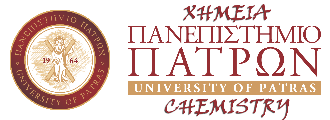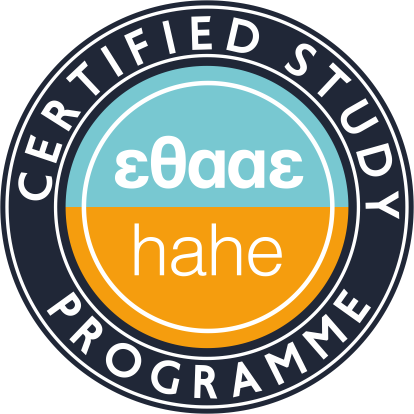 |
With the co-funding of Greece and the European Union |
Professor
Tel: (+302610) 997905
Web Page: http://www.chem.upatras.gr/faculty/tselios
List of Publications:
Contact hours: Tuesday and Thursday 10:00-12:00
Research Project
Title of research project: Development of targeted hormone-dependent cancer therapy
Acronym: ORAMA
Code: Τ2ΕΔΚ-02056
More information is available in official webpage: https://www.oramanetwork.gr/
Participants:
Department of Chemistry, University of Patras, Greece
Research Organization (http://www.chem.upatras.gr/el)
School of Medicine, University of Crete, Greece
Research Organization (http://www.english.med.uoc.gr/)
EXCELYA S.A. (Coordinator)
Enterprise (https://www.excelya.com/)
Sort description:
The gonadotropin releasing hormone GnRH (or LHRH: luteinizing hormone-releasing hormone) is a decapeptide that controls the release of the gonadotropin hormones luteinizing hormone (LH) and follicle stimulating hormone (FSH). Since its discovery, modified peptide analogues of GnRH have been used to treat cancer. GnRH receptors are considered targets for the treatment of hormone-dependent cancers as they are highly expressed in different types of cancer cells. They are expressed in 80 % and 86 % of ovarian and endometrial cancers and 50 % in prostate and breast cancers. Anticancer drugs (antineoplastics) are powerful and very effective but may have serious side effects. For this reason, efforts have been made towards their selective and targeted delivery to reduce their harmful side effects and to achieve better efficacy. Targeted cancer treatment is a challenge, not only to the scientific community, but also to the pharmaceutical industry. In this project, we intend to develop a novel product including an antineoplastic factor bound to a peptide analogue of GnRH. The conjugation will be achieved via a disulfide bond (innovation 1). Selective and quantitative release of the antineoplastic compound will happen by the thioredoxin system that is overexpressed in cancers and is known to selectively reduce disulfides. In addition, mitoxantrone will be used as antineoplastic factor (innovation 2). Mitoxantrone has reduced side effects compared to already used in other conjugates doxorubicin. Finally, the C-terminus of the GnRH peptide bound to mitoxantrone will be modified to ethylamide, as it is existed in Leuprolide (innovation 3).
Objectives – Expected results
The development of the proposed improved and targeted cancer treatment includes the following actions: (i) rational design and synthesis of product; (ii) in vitro evaluation and pharmacological studies (binding, endocytosis and signaling studies) using different types of cancer cells that express GnRH receptor; (iii) stability studies and (iv) in vivo evaluation of synthesised product in experimental hormone-dependent cancer animal model.
The goal is to reduce the side effects of chemotherapy with better efficacy. The use of a GnRH peptide analogues linked to cytostatic / cytotoxic agents may be a successful approach to the development of targeted therapy by reducing the serious side effects of cytotoxic drugs.
Title of research project: Development of an advanced humanized mouse model for multiple sclerosis: application for pre-clinical studies and drug testing
Acronym: AKESO
Code: Τ1ΕΔΚ-01859
More information is available in official webpage: https://www.akeso4ms.gr/
Participants:
Hellenic Pasteur Institute
Research Organization (www.pasteur.gr)
Department of Chemistry, University of Patras, Greece
Research Organization (https://www.chem.upatras.gr)
VIANEX S.A. (Coordinator)
Enterprise (www.vianex.gr); Plant D, Industrial Area of Patras, Greece
Short description:
Multiple Sclerosis (MS) is a chronic inflammatory demyelinating disease of the central nervous system (CNS). Existing experimental animal models of MS are excellent for describing CD4+ T cell-mediated immune responses, but fail to depict other important parameters of MS such as the involvement of B and CD8+ T cells, and the oxidative injury involved in neurodegeneration and possibly also in the transition from the relapsing-remitting to the progressive form of the disease. They also often fail to predict the efficacy and safety of new treatments in humans.
In the AKESO research project we intend to create, for the first time, a fully humanized mouse model of the human immune system in order to study both its function and dysfunction in MS (DR2.MS mice). We will use a new line of severely immunocompromised mice (B2m-NOG), which is one of the most state-of-the-art models for transplantation studies. These lymphopenic mice will serve as recipients of human immune system development by transplantation of human peripheral blood monocytes (PBMC), which include human T and B lymphocytes, myeloid antigen-presenting cells, and a small percentage of stem cells (hematopoietic stem cells- hHSC). This approach has yielded significant results for other autoimmune diseases in recent years.
Objectives – Expected results
1) To develop an advanced humanized mouse model for Multiple Sclerosis (MS), which for the first time will represent human T- as well as B- mediated cell autoimmunity in the pathogenesis of the disease.
2) To demonstrate the role of autoimmunity in the pathogenesis of MS.
3) To create a new improved pre-clinical model for testing new molecules that will target the human immune system for the treatment of MS.
4) To understand the mechanism of immune tolerance induced by ELMog and confirm that it induces T cell tolerance in human T cells and protects DR2.MS mice from disease.
Curriculum Vitae
Prof T. Tselios, born in Messolonghi in January 1971, obtained his diploma (Chemistry) in April 1994, PhD (Organic and medicinal Chmeistry) in October 2001 and MSc (Medicinal Chemistry) in July 2003 from the Department of Chemistry, University of Patras. He has joined, as a visiting scientist, Austin Research Institute, Melbourne Australia (2005 and 2013), School of Chemistry, University of Cardiff, UK (2006, 2008 and 2010) and University of Barcelona, Spain (2010).
Nov2017-May2019: Head of Division A, Department of Chemistry, University of Patras.
Aug2019-Sept2019: Head (first) of the Department of Crop Science, University of Patras (organize the department).
Aug2020-today: Director of “Chemical Biology” Research Institute of P.E.K. University of Patras.
Sept2022-Aug2024: Head of the departmental postgraduate program “Medicinal Chemistry & Chemical Biology” of the departments of Chemistry and Medicine of University of Patras.
Patents
1. Granted in European countries: J. Matsoukas, T. Tselios et al. “Peptide Analogues and Conjugates Thereof”: PCT/IB2008/003493, WO 2009/066175, (28.05.2009), European No. 08851987.1 / 1402/2227486. Short Description: “MBP analogues conjugated with mannan using KLH bridge”.
2. Granted in USA, Australia and all European countries: T. Tselios et al. “Immunotherapy of Multiple Sclerosis Using Mannosylated Peptides as Therapeutic Vaccines”: PCT/IB2009/000382, WO 2009/093143 (30.07.2009). Greece (ΟΒΙ) Νο. 1006998/30.09.2010. European No. 09703874.9 / 1412/2240200; Short Description: “MBP analogues conjugated with mannan via KGn bridge”. Divisional No. 14156495.5; Short Description: “MOG analogues conjugated with mannan via KGn bridge”. Australia No. 2009207345; Short Description: “MOG analogues conjugated with mannan via KGn bridge”. Divisional No. 2014200921; Short Description: “MBP analogues conjugated with mannan via KGn bridge”. USA No. 12/864,019; Short Title: “Conjugates comprising mannan and myelin oligodentrocyte glycoprotein (MOG)”; Short Description: “MOG analogues conjugated with mannan via KGn bridge”. Divisional: No. 14/877,679; Short Title: “Conjugates comprising mannan and myelin basic protein (MBP)”; Short Description: “MBP analogues conjugated with mannan via KGn bridge”.
Overview of Published Work
Overview:
- Publications: 87 (69 the last ten years)
- Average of Impact Factor: almost 4.5
- Total citations (excluding self-citations): more than 1150
- Book Chapters: 10
- Abstracts in Referred Journals: 51
- Conference Proceedings: 78
- Abstract-Proceedings in National Conferences: 97
- Hirsch Index: 28, i10: 58 (Google Scholar), 26 (Scopus)
Courses
Undergraduate teaching
2005-today (Undergraduate teaching): Courses in the field of “Organic Chemistry” & laboratories of “Experimental Organic Chemistry”
Graduate teaching
2005-today (Undergraduate teaching): Courses in the field of “Organic Chemistry” & laboratories of “Experimental Organic Chemistry”
2005-today (Graduate teaching): Courses in Medicinal Chemistry: “NMR Spectroscopy and Molecular Design” and laboratories of “Advanced Experimental Organic Chemistry” (MSc Program “Medicinal Chemistry”).
Research Activities
- Organic, Peptide and Medicinal Chemistry. Rational design and synthesis of linear, cyclic peptide analogues and non-peptide mimetics.
- Conformational studies and Molecular Modelling of bioactive and pharmaceutical molecules. Interactions of bioactive molecules (docking studies). Pharmacophore analysis. Homology Modelling.
Representative Publications
-
I. Friligou, F. Rizzolo, F. Nuti, T. Tselios*, M. Evangelidou, M. Emmanouil, M. Karamita, J. Matsoukas, M. Chelli, P. Rovero, A.M. Papini*. Divergent and convergent synthesis of polymannosylated dibranched antigenic peptide of the immunodominant epitope MBP(83-99). Bioorg. Med. Chem., 2013, 21(21): 6718-6725.
-
T. Tselios*, M. Aggelidakis, A. Tapeinou, V. Tseveleki, I. Kanistras, D. Gatos, J. Matsoukas*. Rational design and synthesis of altered peptide ligands based on human myelin oligodendrocyte glycoprotein 35-55 epitope: inhibition of chronic experimental autoimmune encephalomyelitis in mice. Molecules, 2014, 19(11): 17968-17984.
-
S. Day, T. Tselios, M.E. Androutsou, A. Tapeinou, I. Frilligou, L. Stojanovska, J. Matsoukas, V. Apostolopoulos*. Mannosylated Linear and Cyclic Single Amino Acid Mutant Peptides Using a Small 10 Amino Acid Linker Constitute Promising Candidates Against Multiple Sclerosis. Front. Immunol., 2015, 6: 136.
-
M. Ieronymaki, M.E. Androutsou, A. Pantelia, I. Friligou, M. Crisp, K. High, K. Penkman, D. Gatos, T. Tselios*. Use of the 2-chlorotrityl chloride resin for microwave-assisted solid phase peptide synthesis. Biopolymers, 2015, 104(5): 506-514.
-
V. Tseveleki, T. Tselios*, I. Kanistras, O. Koutsoni, M. Karamita, S.S. Vamvakas, V. Apostolopoulos, E. Dotsika, J. Matsoukas, H. Lassmann, L. Probert*. Immunotherapy of autoimmune encephalomyelitis using mannan-conjugated peptides to target antigen-presenting cells: A pre-clinical study in mice. Exp. Neurol., 2015, 267: 254-267.
-
M.P. Yannakakis, C. Simal, H. Tzoupis, M. Rodi, N. Dargahi, M. Prakash, A. Mouzaki, J.A. Platts, V. Apostolopoulos*, T.V. Tselios*. Design and Synthesis of Non-Peptide Mimetics Mapping the Immunodominant Myelin Basic Protein (MBP83-96) Epitope to Function as T-Cell Receptor Antagonists. Int. J. Mol. Sci., 2017, 18(6), pii: E1215. doi: 10.3390/ijms18061215.
-
A. Tapeinou, E. Giannopoulou, C. Simal, B.E. Hansen, H. Kalofonos, V. Apostolopoulos, A. Vlamis-Gardikas, T. Tselios*. Design, synthesis and evaluation of an anthraquinone derivative conjugated to myelin basic protein immunodominant (MBP85-99) epitope: Towards selective immunosuppression. Eur. J. Med. Chem., 2018, 143: 621-631.
-
M.E. Androutsou, A. Nteli, A. Gkika, M. Avloniti, A. Dagkonaki, L. Probert, T. Tselios*, S.G. Grdadolnik*. Characterization of Asparagine Deamidation in Immunodominant Myelin Oligodendrocyte Glycoprotein Peptide Potential Immunotherapy for the Treatment of Multiple Sclerosis. Int. J. Mol. Sci., 2020, 21(20): 7566.
-
I. Triantafyllakou, N. Clemente, R. K. Khetavat, U. Dianzani, T. Tselios*. Development of PLGA Nanoparticles with a Glycosylated Myelin Oligodendrocyte Glycoprotein Epitope (MOG35-55) against Experimental Autoimmune Encephalomyelitis (EAE). Mol. Pharm., 2022, 19(11):3795-3805.
-
G. Biniari, C. Markatos, A. Nteli, H. Tzoupis, C. Simal, A. Vlamis-Gardikas, V. Karageorgos, I. Pirmettis, P. Petrou, M. Venihaki, G. Liapakis* and T. Tselios*. Rational Design, Synthesis and Binding Affinity Studies of Anthraquinone Derivatives Conjugated to Gonadotropin-Releasing Hormone (GnRH) Analogues towards Selective Immunosuppression of Hormone-Dependent Cancer. Int. J. Mol. Sci. 2023, 24(20): 15232.





